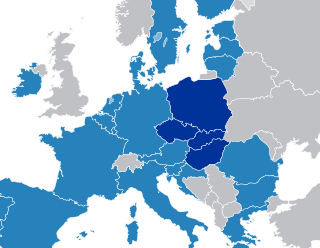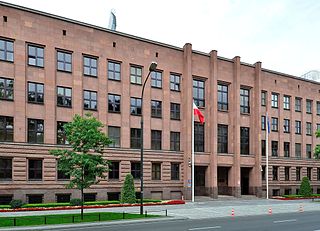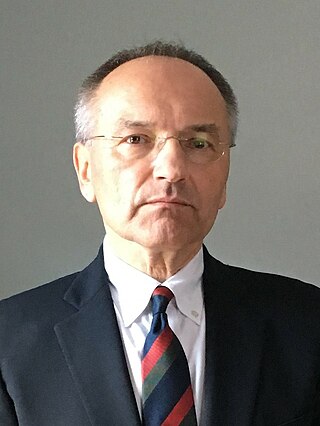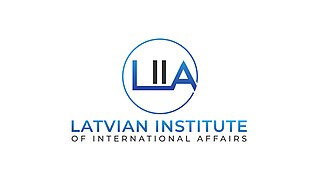
The Visegrád Group is a cultural and political alliance of four Central European countries: the Czech Republic, Hungary, Poland, and Slovakia. The alliance aims to advance co-operation in military, economic, cultural and energy affairs, and to further their integration with the EU. All four states are also members of the European Union (EU), the North Atlantic Treaty Organization (NATO), and the Bucharest Nine (B9).

The Euro-Atlantic Partnership Council (EAPC) is a post–Cold War, North Atlantic Treaty Organization (NATO) institution. The EAPC is a multilateral forum created to improve relations between NATO and non-NATO countries in Europe and Central Asia. States meet to cooperate and discuss political and security issues. It was formed on 29 May 1997 at a Ministers’ meeting held in Sintra, Portugal, as the successor to the North Atlantic Cooperation Council (NACC), which was created in 1991.

Aleksander Kwaśniewski is a Polish politician and journalist. He served as the president of Poland from 1995 to 2005. His tenure as President was marked by modernization of Poland, rapid economic growth, the drafting of a new Polish Constitution (1997), and the accession of Poland to NATO (1999) and the European Union (2004). In 2004, he brokered a pro-democratic agreement during the Orange Revolution in Ukraine.

The Ministry of Foreign Affairs is the Polish government department tasked with maintaining Poland's international relations and coordinating its participation in international and regional supra-national political organisations such as the European Union and United Nations. The head of the ministry holds a place in the Council of Ministers.

The Prague Security Studies Institute is a non-profit, nongovernmental organization established in early 2002 to advance the building of a just, secure, democratic and free-market society in the Czech Republic and other post-communist states. PSSI’s primary mission is to build an ever-growing number of informed and security-minded policy practitioners dedicated to the development and safeguarding of democratic institutions and values in the Czech Republic and its regional neighbors. PSSI works to identify and analyze select foreign policy and security-related concerns in transatlantic relations and other theaters of the world, propose sound, achievable policy responses and host regular roundtables and major conferences on these topics. PSSI is especially alert to the intersection of global finance/energy and national security considerations.

Official relations between Poland and the United States on a diplomatic level were initiated in 1919 after Poland had established itself as a republic after 123 years of being under foreign rule from the Partitions of Poland. However, ties with the United States date back to the 17th century, when the Polish–Lithuanian Commonwealth was one of Europe's largest powers, and many Poles immigrated to the Thirteen Colonies. During the American Revolutionary War, the Polish military commanders Tadeusz Kościuszko and Casimir Pułaski contributed greatly to the Patriot cause, with Kościuszko becoming a national hero in America. Since 1989, Polish–American relations have been strong and Poland is one of the chief European allies of the United States, being part of both NATO and the European Union. There is a strong cultural appreciation between the two nations (Polonophilia). According to the US Department of State, Poland remains a "stalwart ally" and "one of strongest Continental partners in fostering security and prosperity, throughout Europe and the world." Poland was also one of four participating countries in the American-led Iraq War coalition in 2003.

Poland–Ukraine relations revived on an international basis soon after Ukraine gained independence from the Soviet Union in 1991. Poland was the first country to recognize the existence of Ukraine. Various controversies from the shared history of the two countries' peoples occasionally resurface in Polish–Ukrainian relations, but they tend not to have a major influence on the bilateral relations of Poland and Ukraine.

Kosovo–Poland relations refer to the diplomatic, cultural, and economic interactions between the Republic of Kosovo and the Republic of Poland. These relations began in earnest following Kosovo’s declaration of independence from Serbia on February 17, 2008. Poland was one of the first countries to recognize Kosovo’s independence on February 26, 2008, becoming the first Slavic nation to do so.This recognition laid the groundwork for further bilateral collaboration and alignment within European frameworks. The relationship has since evolved to encompass peacekeeping, political support, and modest economic ties.

Poland and the Czech Republic are both members of the European Union and of NATO. Both joined the EU simultaneously on 1 May 2004. They also both joined NATO on 12 March 1999. Both countries, together with Slovakia and Hungary, form the Visegrád Group, which is an important regional group in Central Europe. Both countries are also members of the Bucharest Nine, Three Seas Initiative, OECD, OSCE, Council of Europe and the World Trade Organization.

Andrew Alexander Michta is an American political scientist. He is Director and Senior Fellow of the Atlantic Council's Scowcroft Strategy Initiative. From 2016-2023 he was Dean of the College of International and Security Studies at the George C. Marshall European Center for Security Studies in Germany. Previously he was Professor of National Security Affairs at the US Naval War College. He was also an affiliate of the Minda de Gunzburg Center for European Studies, an Adjunct Fellow at the Center for Strategic and International Studies – Europe Program, and an adjunct political scientist at the RAND Corporation.
The Partnership for Peace Consortium is a network of over 800 defense academies and security studies institutes across 60 countries. Founded in 1998 during the NATO Summit, the PfPC was chartered to promote defense institution building and foster regional stability through multinational education and research, which the PfPC accomplishes via a network of educators and researchers. It is based at the George C. Marshall European Center for Security Studies in Garmisch-Partenkirchen, Germany. According to the PfPC Annual Report of 2012, in 2012 eight hundred defense academies and security studies institutes in 59 countries worked with the PfPC in 69 defense education/defense institution building and policy-relevant events. The Consortium publishes an academic quarterly journal CONNECTIONS in English and Russian. The journal is run by an international Editorial Board of experts and is distributed to over 1,000 institutions in 54 countries.

The Armed Forces of the Republic of Poland, also called the Polish Armed Forces and popularly called Wojsko Polskie in Poland, are the national armed forces of the Republic of Poland. The name has been used since the early 19th century, but can also be applied to earlier periods.
Wrocław Global Forum (WGF) is an annual transatlantic conference centered on topics related to democracy, prosperity and security. Launched in 2010, the event is held in Wrocław, Poland. It is organized by the Atlantic Council, the Polish Institute of International Affairs and the city of Wrocław. The most recent Forum took place on June 2–3, 2016.
The International Forum on Energy Security for the Future: New Sources, Responsibility, Sustainability (ESF) is an initiative on energy security focused on popularization of alternative energy sources in Europe and worldwide. Founded by the Prince Albert II of Monaco Foundation, Aleksander Kwaśniewski's Foundation "Amicus Europae" and Ukraine's leading private oil & gas producer Burisma in 2016. The founders of the Forum are Prince Albert II of Monaco, Nikolay Zlochevskyi and Aleksander Kwaśniewski. The Head of the Organizing Committee of the Forum is Vadym Pozharskyi from Burisma. The Forum offers an exclusive discussion platform to address energy security matters and supports an equal and open dialogue between states, governments, business people, expert community and civil society about the transition to a green economy and renewable energy sources.
The Knight of Freedom Award is a Polish international award conferred annually to "outstanding figures, who promote the values represented by General Casimir Pulaski: freedom, justice, and democracy".
The Warsaw Institute is a Polish nonprofit think tank specializing in geopolitics and international affairs. Founded in 2014, the institute's primary goal is to strengthen the relationship between the United States and Poland. Topics of interest include national security, energy, history, culture, as well as other issues which are seen as being of strategic importance to Poland along with Central and Eastern Europe.

The Latvian Institute of International Affairs is an oldest research center and think tank in Latvia. Founded on May 20, 1992, the organization seeks to provide “Latvia's decision-makers, experts, and the wider public with analysis, recommendations, and information about international developments, regional security issues, and foreign policy strategy and choices.” The Institute develops and publishes research, organises high-level international conferences and promotes cooperation with Latvian and foreign research institutions. The LIIA is a nonprofit and does not receive regular government funding. LIIA’s funding is project-based. Its projects are funded through close cooperation with a range of other organisations and foundations, both Latvian and foreign. The Institute implements international cooperation projects within the European Commission's Horizon Europe and Erasmus+ programs. International projects are also funded by such recognisable supporters as the National Endowment for Democracy, Freedom House, the German Marshall Fund of the United States, the Nordic Council of Ministers, the Konrad Adenauer Stiftung, EEA and Norway Grants. LIIA’s research focuses on important topics such as Latvian foreign policy; transatlantic relations; security issues in the Baltic Sea region; European Union policies, including its neighborhood policy and Eastern Partnership; and multilateral and bilateral relations with Russia.
Katarzyna Emanuela Pisarska is a Polish social entrepreneur, civic activist and academic, specializing in diplomacy and foreign policy.

The Lublin Triangle is a regional alliance of three European countries – Lithuania, Poland, and Ukraine – for the purposes of strengthening mutual military, cultural, economic and political cooperation and supporting Ukraine's integration into the European Union and NATO. The Lublin Triangle initiative invokes the integrative heritage of the 1569 Union of Lublin.













